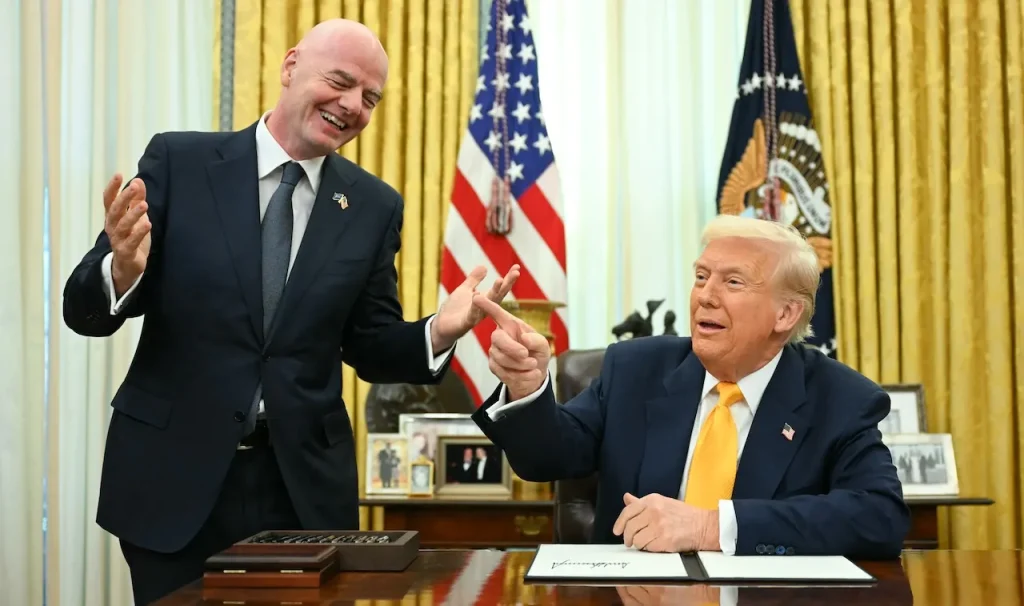FIFA Chief’s Trump Support Raises Neutrality Concerns
Former FIFA governance chairman Miguel Maduro has sparked controversy by suggesting that current FIFA President Gianni Infantino violated the organization’s political neutrality rules when he publicly endorsed President Donald Trump. Speaking at the American Business Forum in Miami, Infantino remarked, “I think we should all support what he’s doing because I think it’s looking pretty good.” This statement, according to Maduro, crosses the line from merely acknowledging Trump’s legitimacy to actively endorsing his political agenda. The comments are particularly significant given FIFA’s strict Code of Ethics, which mandates political neutrality from all officials in dealings with governments and international organizations. These rules are in place to maintain the organization’s independence and integrity on the global stage.
The potential violation hinges on Article 14 of FIFA’s Code of Ethics, which explicitly requires officials to “remain politically neutral, in accordance with the principles and objectives of FIFA.” Violations can result in substantial fines of at least 10,000 Swiss francs and a ban from football-related activities for up to two years. Maduro argues that Infantino’s statement goes beyond merely recognizing Trump’s position, instead actively encouraging support for his policies. “To remain politically neutral requires not taking a position on that political debate, much less arguing that all should support President Trump’s policies,” Maduro told The Athletic. This distinction between acknowledging a leader’s legitimacy and endorsing their agenda forms the crux of the controversy, raising questions about the boundaries of political expression for sports officials.
The relationship between Trump and Infantino has developed significantly over the years, particularly during Trump’s first presidential term when the United States, along with Canada and Mexico, secured the hosting rights for the 2026 World Cup. Their friendship was publicly displayed when Trump hosted Infantino at the White House after the successful bid, where the FIFA president memorably presented Trump with red and yellow penalty cards, jokingly suggesting they could be used on the press. Their rapport continued to grow, culminating in Infantino referring to Trump as “my great friend” during a dinner at the global economic summit in Davos in 2020. Trump later invited the FIFA president to attend the White House signing of the Abraham Accords, demonstrating their ongoing personal connection.
Trump has maintained his interest in football’s global showcase, recently signing an executive order to establish a White House Task Force for the 2026 FIFA World Cup. The former president will chair this task force himself, with Vice President JD Vance serving as vice chair, underscoring the administration’s commitment to the tournament. This close involvement with World Cup preparations further complicates the question of Infantino’s neutrality, as the FIFA president must balance his organization’s relationship with the host nation’s leadership while maintaining political impartiality. The situation highlights the delicate position sports governing bodies occupy when interfacing with political leaders who control resources and permissions crucial to major sporting events.
The controversy emerges against a backdrop of increasing scrutiny over the politicization of sports and the role of governing bodies in maintaining independence from political influence. FIFA, as football’s global governing body, has historically struggled with questions of corruption and undue influence, making adherence to ethical guidelines particularly important for maintaining credibility. Maduro’s critique suggests that even seemingly casual endorsements can potentially undermine the organization’s commitment to neutrality. While FIFA declined to comment on the specific allegations when approached by The Athletic, the situation raises broader questions about how sports organizations should navigate relationships with political figures while preserving their independence.
This incident illustrates the complex intersection of sports, politics, and international diplomacy that characterizes modern global sporting events. As the United States prepares to co-host one of the world’s largest sporting spectacles in 2026, the relationship between FIFA’s leadership and American political figures will remain under scrutiny. Whether Infantino’s comments constitute an actionable violation of FIFA’s ethics code or merely reflect the pragmatic reality of maintaining good relations with host nations remains to be determined. What is clear is that as sports continue to serve as platforms for international cooperation and cultural exchange, the question of political neutrality for sporting officials will remain a delicate balancing act requiring careful navigation of increasingly polarized political environments.


